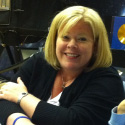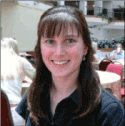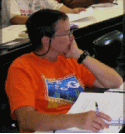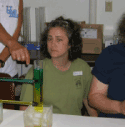 |
|
| SEARCH | SPONSORSHIPS | ||||||||||||
|
Participating in COSEE-OS workshops has afforded further professional development for some participating educators. Below are teachers whom COSEE-OS has sponsored to attend national conferences.
Kristen Crawford Cherry Hill Elementary School River Edge, New Jersey Kristen was selected from a group of 12 educators to attend the Educator-Scientist Collaborative Workshop at NASA's Jet Propulsion Laboratory. Day 1 of the workshop featured eminent NASA scientists who worked collaboratively with educators to examine connections between the water cycle, ocean circulation, climate and sea surface salinity. Using an online Concept Map Builder the scientist/educator teams developed concept maps to enable effective communication of these connections. On Day 2, the educators toured the JPL facility, attached scientist-vetted content (e.g., animations and images, news items) to their online concept maps, and conducted "hands on" activities that support workshop themes. Read Kristen's account of her trip here.
Beth Campbell John Bapst Memorial High School Bangor, Maine The NMEA conference was a wonderful experience for me. As a high school science teacher, I was able to learn about current research topics and gather lesson plans that I can now directly integrate into my biology, oceanography and integrated science courses. The various web-based resources that have been developed using real-time data and simulations are outstanding, accessible resources for educators. The NMEA community is a rich, diverse group of individuals from across the country. I left the conference energized, and ready to reach out to my students and colleagues to stress the importance of the ocean in our lives. I enjoyed meeting individuals from the national network of COSEE centers; these groups can provide my students in Maine a wealth of resources, both from our local area, as well as from other contrasting locations. This conference allowed me to learn a great deal and network with other marine educators. I am so grateful to my sponsoring organization, COSEE-OS, for introducing me to NMEA and allowing me the opportunity to participate in this national conference, which will surely be one of the highlights of my summer! Beth Campbell attended the 2008 National Marine Educators Association Conference as a COSEE-OS representative and has particpated in three COSEE-OS workshops: the Graduate Student / Faculty Collaborative at the Darling Marine Center (2010), Teaching Science by Ocean Inquiry (2007), and Linking the Ocean to the Classroom: Seasons in the Sea - Understanding Change in the Gulf of Maine (2006). Beth holds a B.S. in Biology and an M.S. in Marine Biology from the University of Maine.
Nancy Sills Harris County Carver Middle School Hamilton, Georgia We start the year talking about basic scientific concepts, equipment, etc. I used the Thermal expansion/water thermometer to discuss how thermometers work,the basic changes in the states of matter, and heat transfer. They loved it - we can't wait until we study hydrology and they can do other "labs" that I learned in Maine. I am also using the pictures that I took of the coast to show erosion and weathering. TEACHING SCIENCE BY OCEAN INQUIRY: BRINGING THE OCEAN TO THE CLASSROOM Abstract: A key challenge in promoting ocean literacy is how to get land-locked students interested in the oceans. The answer is: bring the ocean to them. Through lab activities, the internet, and other attention catching formats students can become engaged with learning about an environment that they may never have experienced. This presentation will illustrate how this approach is used in a rural school in Georgia. We will share our experiences (and the thrill) of having students fall in love with the diversity and complexity of the oceans though through inquiry-based learning. [Presented at the 2008 Oceans Sciences Meeting in Orlando, FL, March 2-7] PDF Nancy teaches middle school science. She attended the 2007 COSEE-OS workshop, Teaching Science by Ocean Inquiry.
Tracy Vassiliev James F. Doughty School and William S. Cohen School Bangor, Maine As a middle school teacher my intention was to apply what I learned from the COSEE-OS workshop to interconnect and broaden the understanding of fundamental physical science concepts. Science teachers like me, end up with students that have a better understanding of fundamental science concepts and COSEE-OS gets teachers and students that have a better understanding of ocean processes through inquiry. Many fundamental science concepts are associated with common misconceptions. Being able to identify those misconceptions with Ocean Inquiry activities and to make connections outside the classroom really helps to solidify students' learning, bringing it to a higher level of thinking within Bloom's Taxonomy. COSEE OCEAN SYSTEMS: TEACHING SCIENCE BY OCEAN INVESTIGATION Abstract: COSEE Ocean Systems is creating and evaluating tools to improve understanding of oceans in the earth system. With Tracy Vassiliev (Bangor Middle Schools), we will demonstrate how COSEE-OS activities and principles can interconnect and broaden understanding of basic physical science concepts. Resources are designed to identify misconceptions and make connections outside the classroom, helping to solidify students' learning and promote higher level thinking. The "win-win" result: teachers have students with a better grasp of fundamental science concepts and COSEE-OS supports a community that is well-informed about ocean processes through inquiry. Furthermore, application of key concepts to earth's environment is made fun and exciting with highly interactive digital media. Discover how we are addressing our guiding question: If NASA can create materials that make us feel as if we've visited other planets, why can't we do the same for oceans? Tracy attended the 2007 COSEE-OS workshop, Teaching Science by Ocean Inquiry. |
|
|||||||








